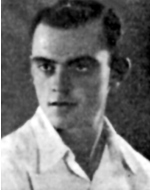Stern, Meir
Son of Cherna and Moshe, was born on 27.1.1927 in the city of Lublin, Poland, to parents with a distinctly Zionist past. In 1936 he immigrated to Israel with his family, who settled in Jerusalem, where he graduated with honors from the Mizrahi School. The school administration decided to grant him a scholarship to continue his studies at the teachers’ seminary. Meir gave up the scholarship because he wanted to go to high school and continue agricultural science alongside practical agricultural work. To this end, he began working in the archive of the Jewish-Arab Fund in Jerusalem and in the evenings studied at the Matriculation High School. From the age of 15 he was already a member of the Haganah and after training and training he was a counselor and a coordinator at Bnei Akiva in Jerusalem. When he returned home in the evening he continued to read until one to two after midnight. He was interested in the humanities and social sciences. He wrote poetry and prose. In his work at Keren Kayemeth LeIsrael, he was so successful that when he decided to study at Mikvah Israel, the administration tried to stop him by all means. Mikveh Yisrael served as a Bnei Akiva coordinator at the site and also at the nearby Holon branch. In the meantime, he was trained in the use of weapons and was responsible for machine guns in the Haganah. With the establishment of Kibbutz Ein Zurim, of which he was one of the founders, he was elected as coordinator of both the agriculture and the culture. Afterward, he was sent to Ein Harod to study the problems of concentrating the agriculture. From there he returned to Ein Zurim as a farm coordinator and was assigned additional duties, which were to be found in Jerusalem. A large part of his spare time in the city was dedicated to the Haganah and was not a weapon he could not repair. Meir volunteered for any dangerous mission that required strong people. He took part in the immigration to Bialia and felt her help when the British besieged her. At the beginning of the War of Independence he was in Sodom and later moved to the Michmash Battalion of the Etzioni Brigade and participated in the battles in the Jerusalem area, Mekor Haim and Talpiot. The cultural evenings he organized and held in Talpiot are still well preserved in the memories of his fellow soldiers since then. Because of the inflammation in his eyes, which was plagued by wind and dust and lack of sleep, he came to six days of vacation in Jerusalem, where he heard that volunteers were asking for Gush Etzion. Despite the opposition, the doctor informed him that he was volunteering to go out and help his friends in Gush Katif. The doctor’s pleas did not help, because he had been given leave and did not have to leave. “I have official freedom from the commander, but not freedom from conscience,” Meir replied. In his letters to his mother from the Gush, he wrote that his compassion and love lay with her and he comforted her and reassured him in the face of all that awaited him. “Life is so Yaffa and full of content,” he wrote, “but there is something even more precious, and that is, to be among the fighters of a nation that has established its independence after thousands of years and during the period of the European Amalek. Upon his arrival in Gush Katif, he was appointed to be responsible for kissing the Russian monastery in the bloc and the retreat of the Haifa fighters to the last of those leaving. After being seriously injured in the head, he was taken to a hospital, where they were to transfer him to Masuot Yitzhak with all the other wounded, with the consent of the Red Cross and under his protection. But when the nurse and the doctor left the room, he slipped away saying that he was wounded in the head but not in his hands. “How will not you help me by war?” – Ask. And fought until the last minute, and according to a friend’s testimony, even when he was wounded, he encouraged his friends. Fell on the day of the last battle on the Bloc, 4 Iyar 5708 (13.5.1948 / 12) On the 17th of Cheshvan 5710 (17.11.1949) he was transferred, together with the rest of the victims of the Gush, to an eternal rest in the military cemetery at Har- Herzl in Jerusalem.
